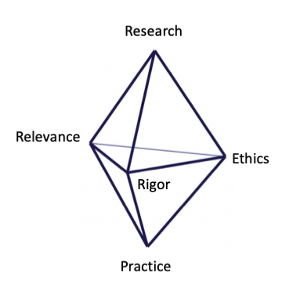article written by the EAPRIL Cloud 11 and the EAPRIL Cloud 13

As previously in several EAPRIL meetings, our joined Cloud 11 and 13 fishbowl for starting practitioners-researchers showed that practice-based research goes hand in hand with professional dilemmas of researchers and practitioners. This time, however, we noticed that beginning researchers may also experience such dilemmas and feel the need to deal with them. During the fishbowl, Lisette and two former students of the Master Learning and Innovation (MLI) at Aeres UAS discussed two dilemmas of these students during their practice-based research. We unraveled both dilemmas on the basis of our triangular bi-pyramid model: the spatial figure created by holding two three-legged pyramids with their base against each other (see image below).

The base in the middle of the bi-piramid introduces three pillars of practice-based research quality: methodological rigor, practical relevance and ethics.
The points on top and at the bottom represent the research perspective and the practice perspective on quality and on the three pillars in particular. After all, not only researchers have an opinion about the quality of a research, but practitioners too.
To understand the content of the discussions, it is important to give some information about the two dilemmas.
- The first dilemma concerned dealing with the issue of practitioners wanting hard causal statements about the relation between the intervention ‘design thinking’ and the outcome ‘boundary crossing’ as a result of the research while the practitioner-researcher couldn’t substantiate this. According to the practitioner-researcher he found mechanisms indicating boundary crossing but he couldn’t prove a causal relation between the design thinking approach and boundary crossing. The practitioner-researcher questioned whether it would have been possible to demonstrate a causality at all.
- The second dilemma concerned the situation in which the practitioner-researcher felt that she was investigating a case study that may well be a coincidence and that she wondered whether her research would be rigorous enough. She wondered if her results were relevant viewed from research perspective.
We explored these dilemmas in the light of our triangular bipyramid model, which was intended to surface relations between rigor, relevance and ethics form both practice and research perspective in these specific contexts. Here we need to put emphasis on ‘intended’ because the two dilemmas, the way to unravel them with our model and the solutions we sought appeared to be less meaningful for students that listened than we had imagined. After listening to the conversation in the fishbowl, the students tried to unravel their own dilemmas with the model in small groups. Although, there were quite a few students who, upon their return, were enthusiastic about discussing the dilemmas this way as it helped them to understand their own (future) dilemmas and search for possible strategies and or solutions, it also seemed quite a challenge for too many of them. This was partly due to fatigue in the group of students: after several days of online meetings, this was the last, on Friday afternoon. Clouds 11 and 13 are not quite content with these results. The more because the model and the approach seem to be meaningful for all kinds of practice-based researchers, including students in their role of starting researchers as we experienced earlier in other (face to face) settings. Because of this, the clouds would like to look further for ways in which unraveling the dilemma and searching for solutions with the model can contribute more to the inquiry stance of starting researchers.
If you wish to have more information about the topic of this article, please feel free to contact the coordinators of the EAPRIL Cloud 11 or Cloud 13 or the EAPRIL Office at info@eapril.org.
Share this post
About the author
Lorem, ipsum dolor sit amet consectetur adipisicing elit. Doloribus incidunt esse labore sint, sequi commodi reprehenderit quos dicta nesciunt quasi tempora nobis amet tenetur suscipit quisquam adipisci minus autem fuga.
